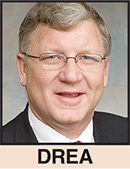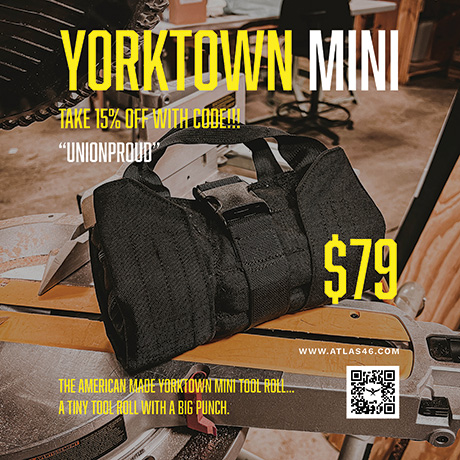AFLCIO’s Drea will lead rally on July 21 in Collinsville
By ELIZABETH DONALD
Illinois Correspondent
Collinsville, IL – Union leaders and members will unite on Thursday, July 21 in support of Illinois’ unique Workers Rights Amendment proposal, which would make so-called “right-to-work” virtually illegal in the state, unlike all others.
Both the state House and Senate have already voted to put the proposal on the Nov. 8 general election ballot. It would be an amendment to Article 1 of the state constitution saying workers have “the fundamental right” to choose collective bargaining by their own representatives and that no law could interfere with those rights.

 “This is huge for Illinois,” said B. Dean Webb, president of the Greater Madison County Federation of Labor. “I believe we would be the first state that’s ever done this.”
“This is huge for Illinois,” said B. Dean Webb, president of the Greater Madison County Federation of Labor. “I believe we would be the first state that’s ever done this.”
Illinois AFL-CIO President Tim Drea will be in Collinsville to lead the public rally, called “Vote Yes for Workers’ Rights,” beginning at 4:30 p.m. on July 21st at IBEW Local 309, 2000 Mall St. Sponsors are the Illinois AFL-CIO, the Madison County Federation, the Southwestern Illinois Central Labor Council, Ullico and the Southwestern Illinois Building and Construction Trades Council.
STRENGTHENING LABOR RIGHTS
Illinois already has legislation on the books that makes “right-to-work” very difficult to enact. In 2019, Gov. J.B. Pritzker signed the Collective Bargaining Freedom Act, which eliminated individual municipalities’ attempts to establish zones that prevented employers and unions from enforcing union security provisions.
It was passed in response to a so-called “right-to-work ordinance” established by the Chicago-area town of Lincolnshire, which had declared itself a “right-to-work” zone. That ordinance was struck down by the U.S. District Court in 2017 and the U.S. Appeals Court in 2018.
 The Collective Bargaining Freedom Act passed the Legislature nearly without opposition: 101-8 in the House and 51-0 in the Senate.
The Collective Bargaining Freedom Act passed the Legislature nearly without opposition: 101-8 in the House and 51-0 in the Senate.
“This legislation makes it abundantly clear that we are turning the page here in Illinois,” Pritzker said then. “No longer will we be divided by false choices and misplaced blame. This is a time when we can and will take bipartisan action to lift up working families.”
RAUNER’S CRUSADE AGAINST UNIONS
But legislation can be rolled back by subsequent administrations, and Pritzker’s predecessor, Bruce Rauner, oversaw a push to roll back Labor rights that resulted in the Janus v. AFSCME decision. Janus went all the way to the U.S. Supreme Court, which ruled that public workers don’t have to pay fair-share fees but still get to retain the benefits of union membership, making them ‘freeloaders.”
 Making the Workers’ Rights Amendment part of the state constitution would make it significantly harder to roll back the bargaining rights of Illinois workers. This is the second half of a two-year process to get the amendment in front of voters, and the vote to put the amendment on the ballot was 80-30 in the House and 49-7 in the Senate.
Making the Workers’ Rights Amendment part of the state constitution would make it significantly harder to roll back the bargaining rights of Illinois workers. This is the second half of a two-year process to get the amendment in front of voters, and the vote to put the amendment on the ballot was 80-30 in the House and 49-7 in the Senate.
“When workers are free to bargain collectively, it leads to safer workplaces, enhanced skill levels and better economic conditions for all workers, whether or not they’re in a union,” state Rep. Lance Yednock (D-Ottawa), said on the floor of the House as he argued in favor of the amendment.
Calling RTW laws “diabolical,” Yednock said states that enact such restrictions on collective bargaining found declines in wages, benefits, training and safety standards.
OPPOSITION FORMS
Meanwhile, a lawsuit has been filed against the amendment by the Liberty Justice Center and Illinois Policy Institute. Liberty Justice is the law firm that won the Janus suit, and the Illinois Policy Institute is a conservative think tank heavily advocating against the amendment.
However, the circuit court in Sangamon County has now ruled that there is no dispute that the legislature passed the amendment and approved its language, and that the opponents’ suit lacks any reasonable argument to stop it from appearing on the ballot.
“There are no grounds for denying the voters the opportunity to decide whether to add the Workers’ Rights Amendment to the Illinois constitution,” read the court’s decision as rendered by Circuit Court Judge Raylene DeWitte Grischow. The Illinois Policy Institute has vowed to appeal the decision.
More information about the amendment can be found at workersrights.com.



NO
Right to work!